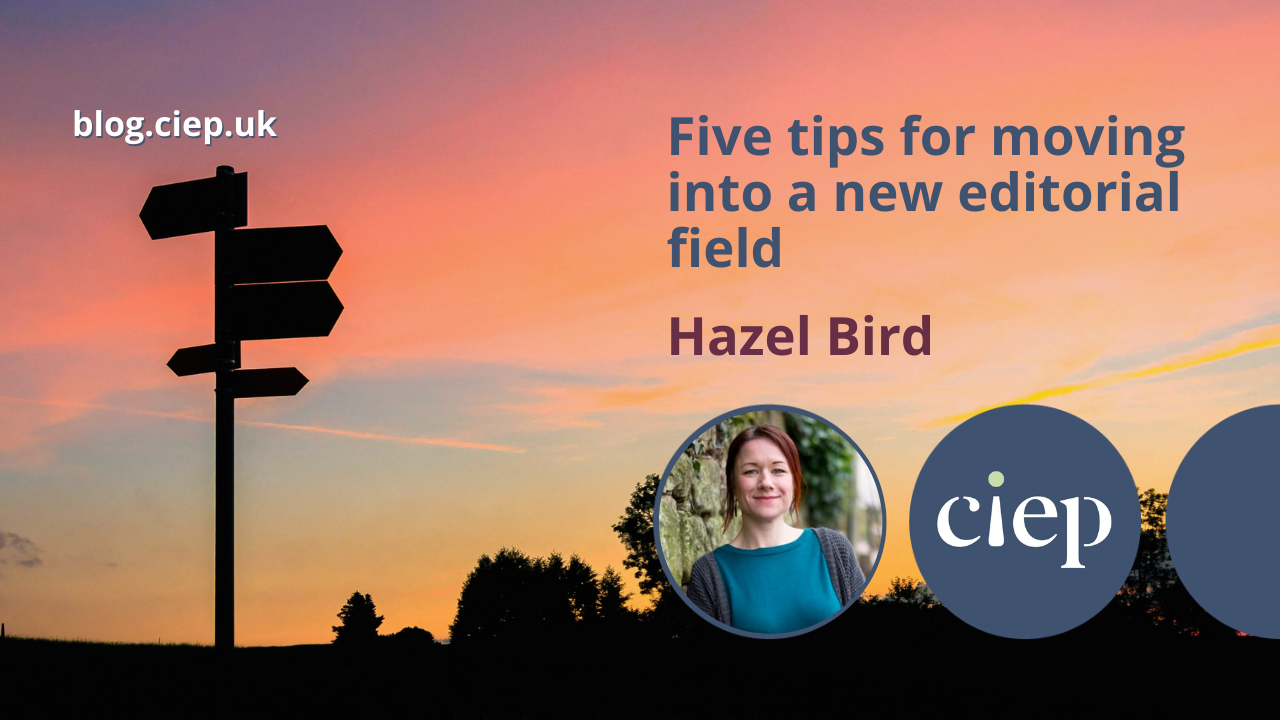Are you looking for a new editorial challenge, or would you like to expand into a new area? Hazel Bird has changed the focus of her editorial business over the past few years and here she gives advice on how to enter a new field.
One of the best things about freelancing is that you have full freedom to evolve your business however you see fit. Sometimes this evolution will be leisurely – a new macro here, a new webinar there – whereas at other times you might want to grab your business by the footnotes and drag it bodily into a whole new paradigm.
Moving into a new field is one such potential business evolution, and it can be done slowly or at speed. I’ve had a go at both. After I started out in 2009, for several years I worked almost exclusively on academic content, but then over time I gradually accepted more and more work in other fields, such as a charity magazine and books on business and digital topics. But then, a few years ago, I decided I wanted to much more decisively pivot in the charity/business direction.
This post will recount some of my experiences and give suggestions on how to move into a new editorial field. Whether you do it circumspectly or more resolutely is up to you!
1 Use what you already know
The charity magazine I proofread during my slow evolution phase was the membership magazine of what is now the Royal Osteoporosis Society. I also sometimes proofread some of the charity’s materials aimed at practitioners in the field (researchers, doctors, radiographers, etc).
As a humanities graduate whose formal scientific education ended at age 16, I arguably wasn’t the best placed to work on such material. However, I was able to demonstrate familiarity with scientific concepts, terminology and editorial practices through the social sciences and psychiatry texts I’d ended up editing for my academic clients (which in itself demonstrates an earlier slow evolution, from humanities onto the edges of the sciences, albeit still within academia). I also had a strong personal interest in nutrition and fitness, which came in very handy when proofreading diet and exercise advice for people with osteoporosis.
The key thing is to know your limits. Had I been offered intensive scientific copyediting, I would definitely have turned it down. However, I felt quite confident proofreading expert-approved text – and in fact my relative ignorance sometimes came in useful by making it easier for me to see things from the perspective of the reader (potentially a person newly diagnosed with osteoporosis and with very little idea of what this meant).
2 Understand your role in the relationship
Sometimes moving fields means working with a whole different type of client. It’s therefore important to understand how clients in your new field will expect the business relationship to work.
For example, taking two extremes from my career, there are big differences between working with academic packagers and working with large non-profits. In the first case, the packager usually sets the terms and fees and establishes the standard of work required. They generally have a good understanding of how publishing works, and there often isn’t a great deal of client management needed beyond managing queries helpfully and submitting and chasing invoices.
In the second case, you’re much more in the driving seat. The client may have very stringent editorial standards. However, they may also have comparatively little practical experience working out how to actually achieve those standards. There is also more of a need to manage the relationship through onboarding, terms and conditions, and ongoing negotiation of fees.
Some of what’s expected you’ll only find out after you begin a working relationship with a specific client. However, the next tip may help you to get some clues about the field in general …
3 Know their world and speak their language
If you’re brand new or a relative outsider to the field you want to move into, there’s a world of nuance that you won’t understand (yet). You’ll need to learn all the specialist terminology – and then when and for which audiences it should be used (versus when the audience will deem it unhelpful jargon).
It can therefore be helpful to follow relevant people on social media – both practitioners (ie potential clients) and other editors who already work in your desired field. Pay attention to the words they use and how they talk about concepts. Read the kinds of publication you aspire to work on. And obviously you can pick up relevant books, attend webinars and industry conferences, and consider getting a new qualification or two. Once you start working in your new field, you might also want to add a bit of padding into your schedules where possible, to enable you to read around topics with which you’re less familiar.
Another crucial place where you need to know your potential clients’ world is in your marketing. This is one I’m still working on, but the point is to speak their language on social media and in your blog posts, quotes and so on, so that you’re identifying their pain points and showing how you can help.
4 Be prepared to be flexible
Ideally, opportunities in your new field will arrive exactly when you have time for them. Naturally, though, sod’s law means your dream client is going to send you an enquiry for work needing to be done tomorrow when you’re already booked solid for the next four weeks.
So, what do you do? You might choose to do the extra hours, especially if the new work might turn into a long-term collaboration or the fee is especially enticing. Alternatively, you might turn down this particular offer but thenceforth be more proactive, using the fact that your ideal clients are finding you as a confidence-booster to encourage you to step back from some of your old clients to make space for new opportunities.
Or you might do a bit of both. The right option will depend on your circumstances and other commitments. If you choose to dial down your current workload, it’s obviously important to ensure you have enough cashflow to tide you over if the enquiries don’t come flooding in as quickly as you hope. You can also pick your timing for doing this carefully – for example, by embarking on a chunk of CPD or a big business development project so you’re not left twiddling your thumbs if work is sparse.
5 Remember that you don’t need to be overqualified, just qualified
As Harvard Business Review says: ‘It is important, of course, to have at least some of the skills a job requires up front. But nobody should limit themselves only to positions for which they are already overqualified.’ (The article is about employed positions but the ideas apply to freelancing too.)
It’s easy to hold yourself back from new opportunities, imagining that everyone else is ten times more qualified than you or has a career’s worth of relevant experience. Our old friend impostor syndrome can have much to answer for here too. So it can help to remember that you’re not (yet) looking to be the best in your new field – just competent enough to offer your clients a sound, professional service that you can build on in the future.
Whether you move into your new field cautiously or with a bang, I’d say that the overall theme here is flexibility. It’s about using what you know but being ready to adapt your approach and mindset to a whole new arena, without making assumptions. If you can do that responsively and with imagination, putting yourself in the shoes of your new client and their readership, you’re unlikely to go far wrong.
About Hazel Bird
 Hazel works with non-fiction clients around the world to help them deliver some of their most prestigious publications in areas such as charity and peace work, digital and technology, and business and leadership. An editor since 2007, she aims to see the big picture while pinpointing every detail. She has been described as ‘superhuman’ and a ‘secret weapon’, but until Tony Stark comes calling she’s dedicating her superpowers to text-based endeavours.
Hazel works with non-fiction clients around the world to help them deliver some of their most prestigious publications in areas such as charity and peace work, digital and technology, and business and leadership. An editor since 2007, she aims to see the big picture while pinpointing every detail. She has been described as ‘superhuman’ and a ‘secret weapon’, but until Tony Stark comes calling she’s dedicating her superpowers to text-based endeavours.
 About the CIEP
About the CIEP
The Chartered Institute of Editing and Proofreading (CIEP) is a non-profit body promoting excellence in English language editing. We set and demonstrate editorial standards, and we are a community, training hub and support network for editorial professionals – the people who work to make text accurate, clear and fit for purpose.
Find out more about:
Photo credits: header image by Jan Huber on Unsplash, tiles spelling ‘time for change’ by Alexas_Fotos on Pixabay.
Posted by Eleanor Smith, blog assistant.
The views expressed here do not necessarily reflect those of the CIEP.





